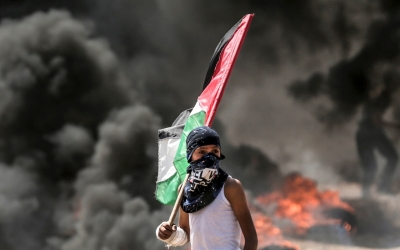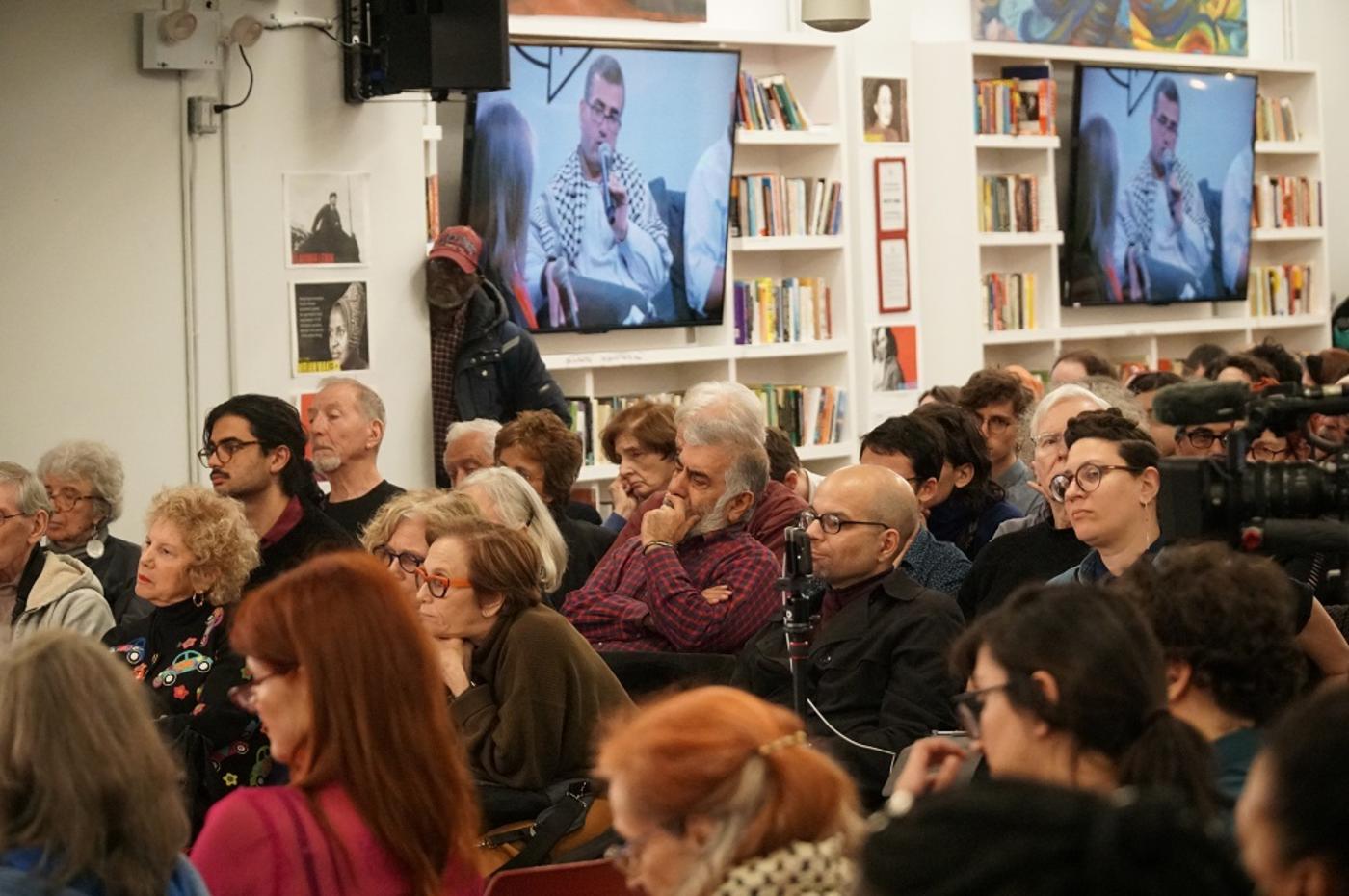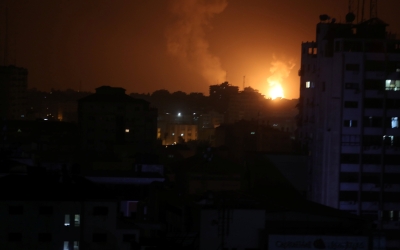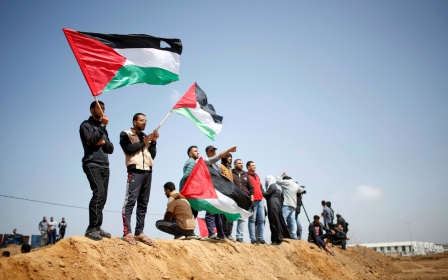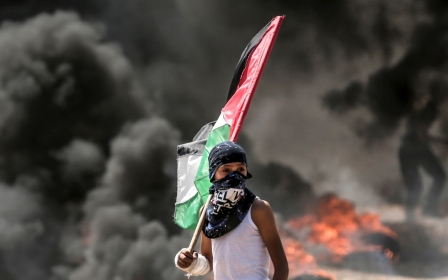'Stop funding Israel,' Gaza's Ahmed Abu Artema tells New Yorkers

Ahmed Abu Artema, the Palestinian writer whose social media post catalysed the Great March of Return in Gaza in 2018, delivered a rousing and moving account of life in Gaza, during a special event held in New York City on Thursday.
Artema, on a nine-city speaking tour of the United States with The American Friends Service Committee (AFSC) to raise awareness of the deteriorating conditions in Gaza, was interviewed by broadcaster Amy Goodman along with Jehad Abusalim, a Palestinian from Gaza studying for a doctorate in Hebrew and Judaic Studies and History at New York University.
"I come to you from a place where leaving is a success story," 34-year-old Artema said as he began his opening remarks at the People's Forum.
New MEE newsletter: Jerusalem Dispatch
Sign up to get the latest insights and analysis on Israel-Palestine, alongside Turkey Unpacked and other MEE newsletters
"My being in front of you today is evidence of how lucky I am compared to many fellow Palestinians who have never travelled even once in their life.
"My attempts to travel started six years ago, and only happened once I got an invitation from the UN to go to Amman [Jordan]," Artema said.
Freedom, not fences
Artema's remarks about travel restrictions was a prelude to larger story of Gaza as a prison where the 2.2 million Palestinians there have been stripped off their freedom and basic dignity.
"I love freedom and I hate fences ... fences represent a moral and political failure," he said, reiterating his belief in a one-state solution in which Israelis and Palestinians could live together, side-by-side, one day.
Recounting the days preceding his writing of the now famous social media post calling on all Palestinians to return to their original homes, Artema said that he had repeatedly watched a flock of birds fly across the fence with Israel with ease.
"I hate the occupation because it is against human nature. It clips my wings."
But he had no idea that his post on Facebook would ignite an entire movement.
Since 30 March 2018, tens of thousands of Palestinians have taken part in the Great March of Return protests in Gaza.
Protesters walk towards the boundary fence with Israel, demanding they be allowed to return to the lands and homes their families had been expelled from in 1948. Israeli forces have responded to the marches with immense brutality.
According to the UN, 189 Palestinians, including Razan al-Najjar, a 21-year-old female paramedic, have been killed Israeli sniper fire.
At least 35 children are part of the death toll. Other estimates say the overall death toll is closer to 250.
Israel says that the ongoing protests are organised by Hamas and that it has a right to defend itself.
But a United Nations Commission of Inquiry on the 2018 protests concluded that there was no justification for firing at protesters with live ammunition.
Commenting on the report and the the blockade on Gaza last month, Michael Lynk, the Special Rapporteur on the situation of human rights in the Palestinian Territory occupied since 1967, said: "Continuing to suffocate Gaza is a blot on the world's conscience and a recipe for more bloodshed."
Israel has launched three military campaigns on Gaza since 2008, killing thousands, crippling the economy and flattening infrastructure.
Answering a question from Goodman about the response in the United States "to the overwhelming onslaught against this nonviolent movement" Abusalim, said Palestinians are often asked when they would produce "a Gandhi".
But Gandhi would likely have been shot if he had protested near the Gaza fence, Abusalim said.
"[Coverage in the US] always dehumanises the Palestinian experience. It does not consider Palestinian agency no matter what Palestinians do. It is always looked at from an Israeli national security lens," he said.
"By virtue of few children throwing rocks or burning tyres, for journalists here [in the US] the march loses its [legitimacy]."
'Loyal to justice'
Around 200 people attended the event at the People's Forum in Manhattan. Audience members told Middle East Eye that they felt "moved" by the testimony.
"I could feel how rare of an opportunity it was to have him here, and listen to him," Reuben Telushkin, an organiser with Jewish Voices for Peace, said.
"Also to hear the deep humanity. This is a man motivated by values of justice, equality, and freedom. Not hate."
Likewise, Noran Elzarka, 25, told MEE that despite knowing much about the situation in Palestine, she couldn't help but feel moved by the very personal story of Artema
"Every Palestinian carries their own story. Their individual experiences teach us something, different," Elzarka said.
Another attendee, Dan Rous, said he was appalled by what was going on in Israel.
"I am Jewish. But I am loyal to justice," the 76-year-old said.
On Wednesday, the US government released a report in which it dropped the use of "occupied" when describing the Syrian Golan heights and Palestinian territories, choosing instead to call them "Israeli-controlled".
It comes as tensions between the Israel and Hamas, the group that controls Gaza, rapidly escalate.
Israel launched a series of air strikes on Gaza this week - the first since 2014 - in what it describes as a response to rockets fired at Tel Aviv. Fears are rising of a new Israeli bombardment of Gaza.
On Friday, Great March of Return organisers announced the postponement of the day's scheduled protests "to protect our people due to the escalation and the Israeli aggression".
Artema said that Palestinians want Americans to put pressure on their government to stop funding Israel.
"This tax money [going to Israel] means more Palestinian victims, more bullets hitting bodies of children. In the past four weeks, four children were killed. What threat did they pose to Israeli state?
"I cannot imagine how in the 21st century there are states based on walls, fences, discrimination against people. Let us struggle to make this world better by supporting the people who struggle for freedom and justice.
"When justice prevails. It will be better for all people."
Middle East Eye delivers independent and unrivalled coverage and analysis of the Middle East, North Africa and beyond. To learn more about republishing this content and the associated fees, please fill out this form. More about MEE can be found here.


